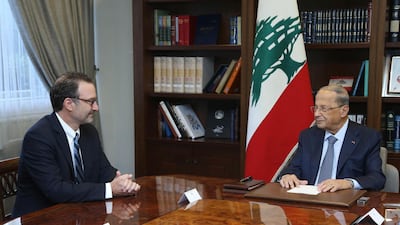Israel and Lebanon have agreed to hold negotiations on their maritime border, in a bid to break years of deadlock, a spokesman for Energy Minister Yuval Steinitz said on Friday.
The two counties have locked horns for over a decade over an 86-square-kilometre area in the eastern Mediterranean Sea, which is rich in minerals and natural gas.
Talks are set to begin in mid-October in the southern Lebanese city of Naquora, near Rosh Hanikra, where headquarters for the UN Interim Force in Lebanon are based.
A senior American official, likely Assistant Secretary of State for Near East Affairs David Schenker, will oversee the talks, along with a UN rapporteur.
On a visit to Israel last week, Mr Schenker agreed with Mr Steinitz and Israeli Foreign Minister Gabriel Ashkenazi to launch a new round of talks this week.
The Trump administration has long been pushing for talks between the two sides, to demark the two Middle Eastern nations’ maritime borders.
The renewed push for talks, coming off the back of new treaties signed with Israel, the UAE and Bahrain that the US has brokered, is timed just weeks before the US general election in November, where Mr Trump is seeking re-election.
The border dispute is also the reason for the US halting its own plans for natural gas exploration in the area, a development that has piqued the interest of several US energy giants, Axios reported.
Israel has agreed to split the contested area 58:42 in favour of Lebanon, which would like to start drilling for gas as soon as possible as it looks to bounce back from its economic crisis.
But talks have so far failed, as Israel has opposed UN mediation and Hezbollah, who hold a powerful position in the Lebanese administration, has repeatedly stalled the negotiations.
Lebanese President Michel Aoun gave a thorny address at the UN General Assembly's 75th session on Wednesday, calling on the international community to force Israel to stop violating his country's sovereignty, and using its airspace to attack Syria.
He expressed his commitment to implementing the UNSC resolution 1701, which calls for full cessation of hostilities and Israel’s withdrawal from southern Lebanon.

